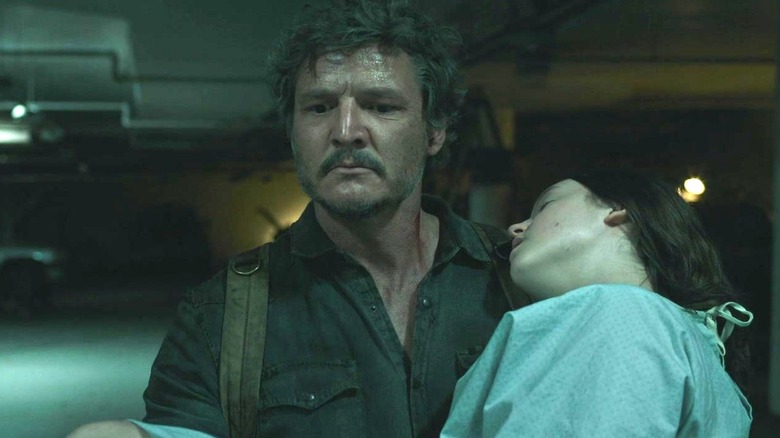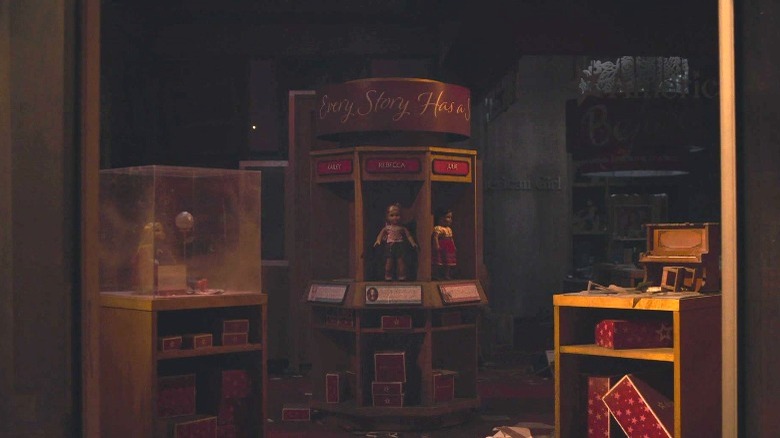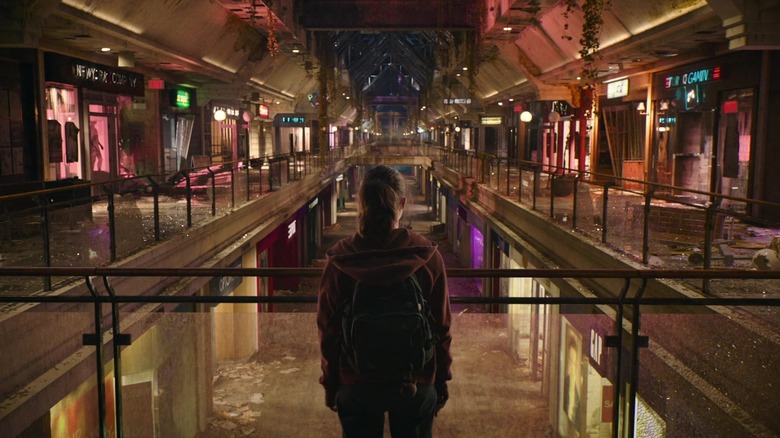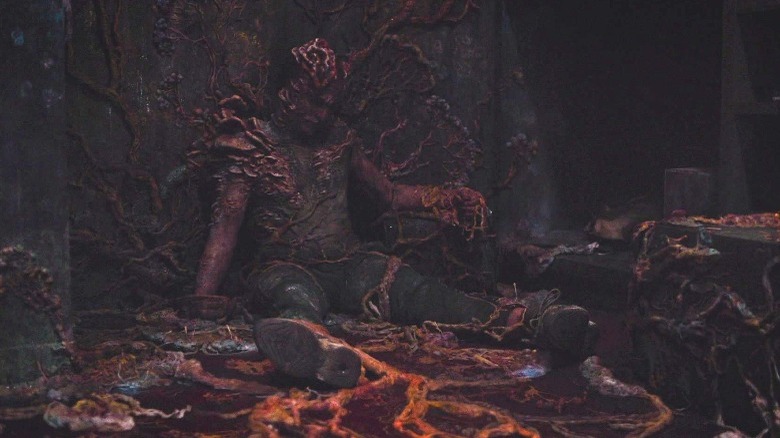There's A Scene That The Last Of Us Won't Show Us That's Way Darker Than Anything In The Finale
For now, we've seen the last of "The Last of Us," the HBO drama that bravely asked, "what if a video game adaptation didn't make its fans bleed out of their ears?" Across nine episodes and twelve emotional breakdowns, viewers were taken on a bleak cross-country journey, learning important lessons along the way: "Baseball bats are a stabbing hazard." "Nick Offerman will make you cry." "Audiences weren't really tired of zombie shows. We just wanted 'The Walking Dead' to be better."
With a season-long bleak, no-heroes attitude toward violence, the show's first season finale no doubt shocked some viewers, with Joel (Pedro Pascal) going all third-act-of-a-"John-Wick"-sequel on a Firefly hospital. Bullets were fired. Sad music was played. The bodies, in deference to the work of Drowning Pool, hit the floor. Joel, his panic disorder somehow cured by semi-regular gut injections of penicillin, became galvanized in his steely dedication to the protection of Ellie (Bella Ramsey), seemingly willing to sacrifice anything to keep her safe.
But even after all of that — after dozens of deaths, after mind-shattering body horror, and nine episodes of chilling reminders that man was the real monster all along, there's a significantly darker story hiding under the details of "The Last Of Us." It's a story pulled not from the source material or even the show itself but from the breadcrumb trail of tragedy left by careful narrative structure. It's the sort of thing that you really only notice if you never played the games and spent a good chunk of the finale saying "more like 'Giraffest of Us,' right?" to your dog.
It's the story of the guy who gutted that American Girl store from episode seven. And yes, are we going off on a tangent here, based on circumstantial evidence and fun speculation? Maybe...
There's a story behind The Last of Us' American Girl store
During the events of "Left Behind," the seventh episode of "The Last Of Us," we learn plenty about the world in its post-cordyceps glory. In a fossilized reminder of life at the start of the infection's spread, we get a glimpse at a local shopping mall, where necessities were looted — violently, ruthlessly — in the moments when it first became clear that things were never going to be okay again. Meanwhile, stuff like fancy soap apparently didn't hold the public's attention.
But what did catch someone's eye, at least according to one bleak, foreshadowing shot from the episode, was the mall's collection of American Girl dolls. Inside the American Girl shop, some unholy chaos had clearly taken place. Things weren't on par with, say, what a sporting goods store might look like, but nonetheless — boxes were overturned, displays were emptied out. The conclusion is unavoidable: Somebody, facing death at the hands of his fellow man or infection by an unknowable enemy, braved the outside world in the first days of the apocalypse in order to get his hands on a new summer wardrobe for Josefina. We may never know his real name, so let's call him Gus Oates.
The inferred apocalyptic decision making of The Last of Us
It might be helpful to try a thought experiment. Imagine that the world is, best as anyone can tell, about to collapse due to cordyceps fungus. If you've learned anything from the pop culture of the last two decades, it's that savagery and lawlessness will probably be the foreseeable norm. The streets are crowded with looters. Time is running out to secure whatever supplies will, in all likelihood, define the final days of your existence.
Now imagine how fully doinked your life would have to be for you to think, "you know what? I'd feel better if Samantha was here."
Maybe that's exactly what Gus Oates thought as the air raid sirens blasted through Beantown on that fateful September day. Gus Oates grew up in Boston, the younger of two siblings. Never the smartest in his class, strongest, or the most handsome, he trudged through his younger years under the impression that he excelled in only one substantive way: No matter how bad things got, Gus did not react. He was as stony-faced when his classmates took seats at adjacent desks and whispered cruel jokes about him as he was when his beloved older sister confided in him the thrilling, cosmopolitan secrets of an older sibling. In his quiet calm, he was quickly forgotten by bullies and became an emotionally safe deposit box for his sister.
Everything changed one night when Gus's sister didn't return home from a party that he, confidant that he was, had known she'd be attending.
By the time the infection started spreading, Gus's mother, long since lost at the bottom of a bottle, had been forcing Gus to sleep in his sister's old room, surrounded by her trophies, her artwork — her beloved American Girl dolls.
Was Gus Oates already in The Last of Us?
A fuguelike state likely came over Gus Oates as he looked down from the second-story bedroom window of the cold, quiet brownstone where he'd remained with his mother years into his adulthood. Watching as his neighbors panicked, some fleeing, some securing their homes, he knew that time was short. His mother was a lost cause. It was Gus's time now.
The pieces clicked together all at once. The only home he'd ever really had was with his sister, sitting at the edge of her bed, surrounded by her dolls. He'd always wanted to buy them new outfits and accessories to make his sister happy but lacked the means as a child to do so. Today was his day.
Unaffected by the sobs of his panicked mother, Gus Oates walked out into the outside world. He was possessed with a determination he had never before experienced. Brutishly, he pulled an elderly neighbor from the driver's seat of his car as the old man tried to escape the city. Cold, dispassionate, the way he'd taught himself to be, he drove to the mall.
Looters milled around Gus Oates like river rapids around an immovable stone. Single-minded, he walked to the American Girl store, where he had to wrestle a real weirdo for a Felicity doll. Then Gus's appendix burst for unrelated reasons, and he sat quietly in the corner, where cordyceps swiftly consumed him, turning him into the monster that bit Ellie later in episode seven.
Or maybe one of the infected wandered through the shop at some point and knocked a bunch of stuff over. Either way, huge drag. Maybe season two of "The Last Of Us" will do a flashback.
"Giraffest of Us." Good stuff.



